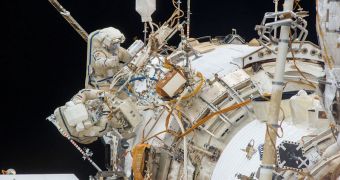On Monday, January 27, two cosmonauts of the Russian Federal Space Agency (RosCosmos) ventured outside the International Space Station (ISS), on a second extravehicular activity (ESA) to install two high-definition cameras provided by the UrtheCast Corporation, of Vancouver, Canada.
A previous spacewalk to install the camera duo occurred in December, where a series of glitches related to signal reception forced the two cosmonauts to schedule a new sortie. Both imagers have to be installed on the outer hull of the space lab.
During yesterday's spacewalk, which lasted a little over six hours, cosmonauts Oleg Kotov – the commander of Expedition 38 to the ISS – and Sergey Ryaznskiy, a flight engineer for the mission, were successful in installing the cameras in their respective slots.
Even so, one of the devices obstinately refused to return any signal to Mission Control on Earth. The spacewalking duo had to return inside the station knowing that a third EVA might already be in the works for them. Engineers estimate that a wiring problem inside the camera is responsible for the failure to properly downlink signals.
The EVA began at 1400 GMT, when the two cosmonauts entered the Pirs docking module on the ISS. Fortunately, the spacewalk did not last as long as the one on December 27, 2013, which set a new record, at 8 hours and 7 minutes, Space reports.
In late December, the cameras were successfully installed at first, but then had to be removed and brought back inside the station when a series of connectivity issues were detected. Kotov and Ryaznskiy have been working with RosCosmos and UrtheCast engineers ever since on fixing the issue, but only partial success was apparently achieved.
After yesterday's sortie, RosCosmos told its cosmonauts that there would definitely not be a third spacewalk scheduled for fixing these cameras. The problem with the medium-resolution unit is that one of its internal wires may be routed incorrectly, meaning that there is nothing the astronauts can do to fix it.
Fortunately, UrtheCast will be able to stream video from its 4K ultra-HD camera on the Internet .The company says that the testing and commissioning periods are currently expected to take a few months.

 14 DAY TRIAL //
14 DAY TRIAL //